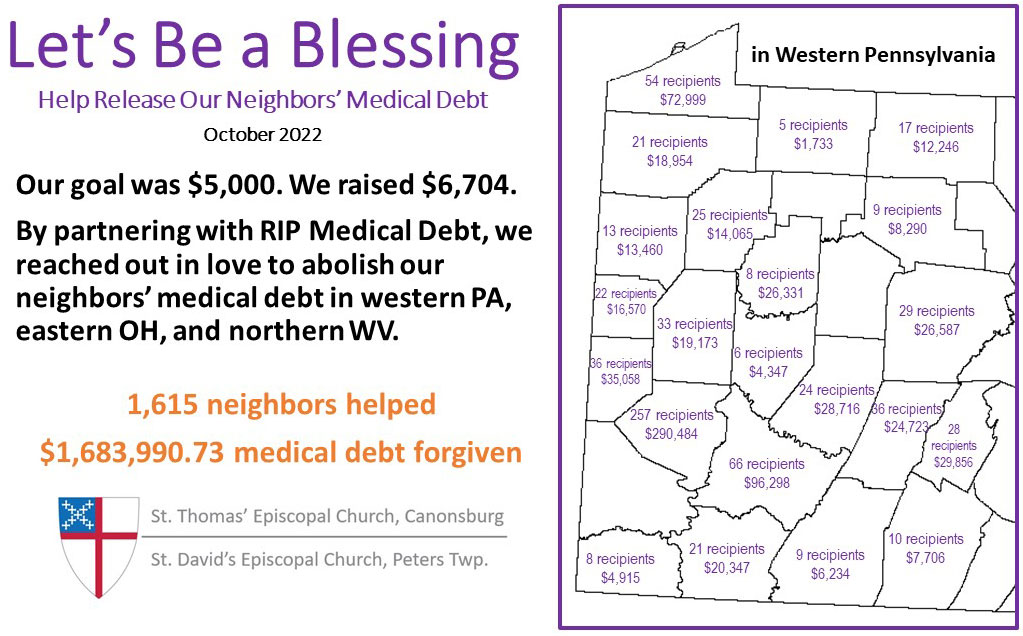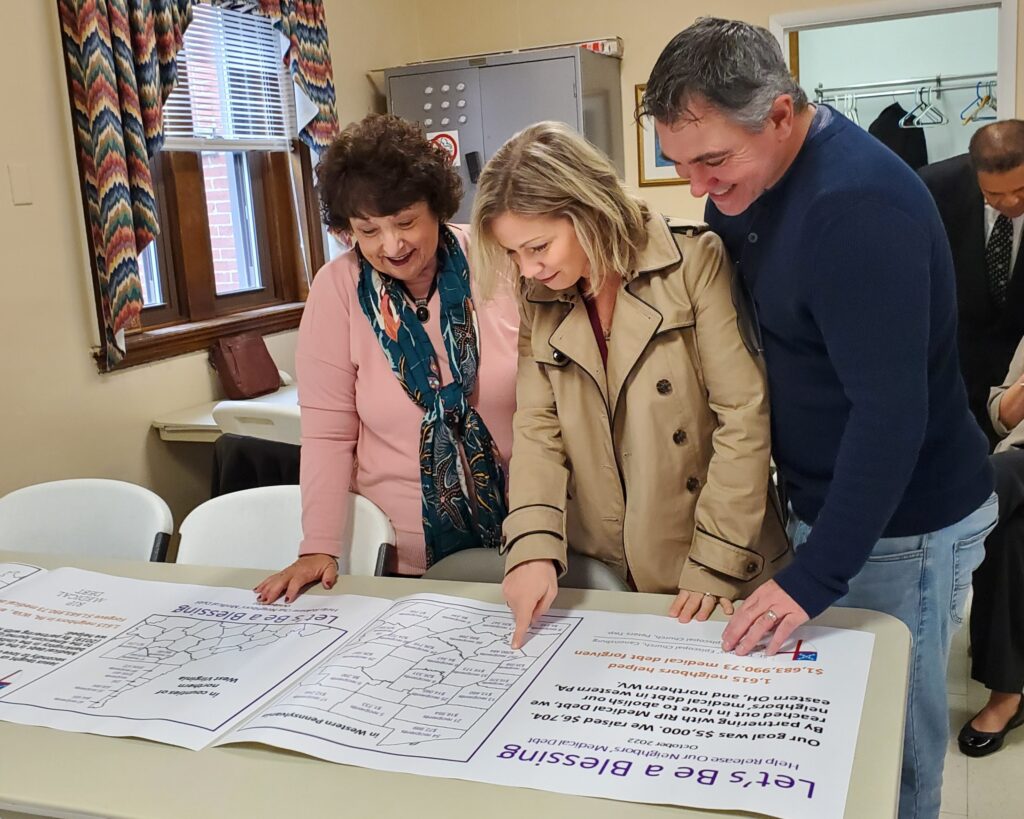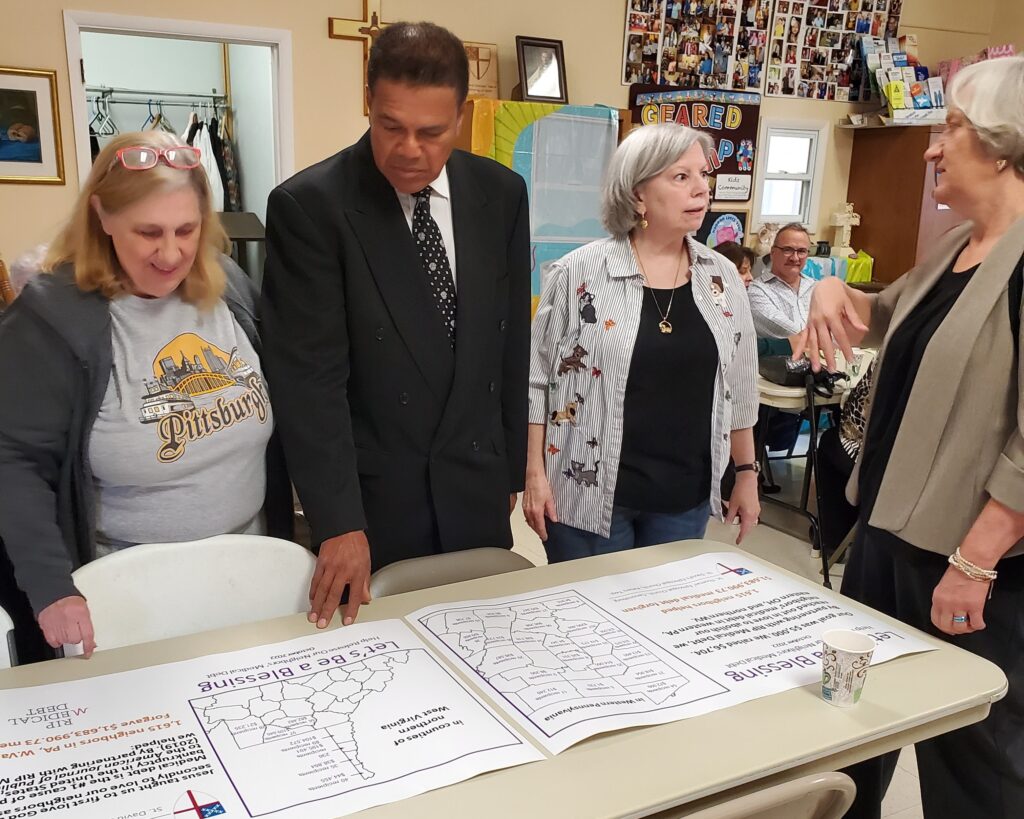
It’s no hoax!
Letters promising medical debt cancellation arriving in 1,615 mailboxes throughout western PA, eastern Ohio, and northern W.Va. are the real deal.
Episcopalians in Washington County recently purchased and forgave $1.68 million in regional medical debts with no strings attached.
St. Thomas’ Episcopal Church in Canonsburg and St. David’s Episcopal Church in Peters Township launched their debt forgiveness campaign called “Let’s be a Blessing” in June.

Parishioners discuss results of Washington County Episcopalians’ “Let’s be a blessing” campaign during coffee hour at St. Thomas’ Episcopal Church in Canonsburg on October 16. Photo courtesy St. Thomas’ Episcopal Church
“Personally, I get such a feeling of joy in thinking about folks getting a letter in the mail telling them that their debt has been forgiven when they weren’t expecting it or probably ever thinking that something like that could happen. It’s all grace! If setting those held captive by crushing debt isn’t the Gospel, I’m not sure what is,” according to the Rev. Canon Cathy Brall who leads the Canonsburg congregation.
Brall’s counterpart in Peters Township, the Rev. Kris Opat, explained that, “While we may have some control over our health, most emergencies that lead to medical debt are unexpected and largely unavoidable. Since health insurance is typically tied to a job, anyone unemployed is at high risk. Anyone in a difficult financial situation is already struggling so adding thousands of dollars of debt just makes things untenable. As Christians we are called to support and care for the poor and those in need.”
In Canonsburg, “Several people shared that they would contribute out of gratitude for the coverage they had received through their insurance plans and the realization that not everyone was as blessed as they were,” according to Brall.
The churches hoped to raise $5,000. When the campaign ended in September members and friends of the two congregations had raised $6,704.79.

Parishioners discuss results of Washington County Episcopalians’ “Let’s be a blessing” campaign during coffee hour at St. Thomas’ Episcopal Church in Canonsburg on October 16. Photo courtesy St. Thomas’ Episcopal Church
Brall recalls, “At first raising $5,000 for a small congregation like ours with an $80,000 annual budget seemed daunting to some, but we began to believe it would be possible. Everyone was really overjoyed when we exceeded our goal by almost 35%.”
St. Thomas’ and St. David’s partnered with RIP Medical Debt, a non-profit organization, that flips the traditional bill collection model on its head to help donors erase medical debts. By purchasing medical debt portfolios for pennies on the dollar, donors keep them from falling into the hands of debt collection agencies.
Campaign coordinator Samuel Richards of Bentleyville notes, “Medical debt is surely an evil of our time. No one should go bankrupt because they got sick. People trying to heal don’t need the added aggravation of aggressive bill collectors. Working with RIP Medical Debt is one way to help folks caught in broken parts of our healthcare system.”
RIP Medical Debt purchases pre-qualified debt portfolios that meet one of two criteria. Recipients either earn less than 4 times the federal poverty level or their medical debts are 5% or more of annual income.
“RIP Medical Debt is easy to work with and available debt portfolios are always changing. I hope others will consider contributing to medical debt relief efforts. This is an instance where a little money goes a long way,” said Richards.
